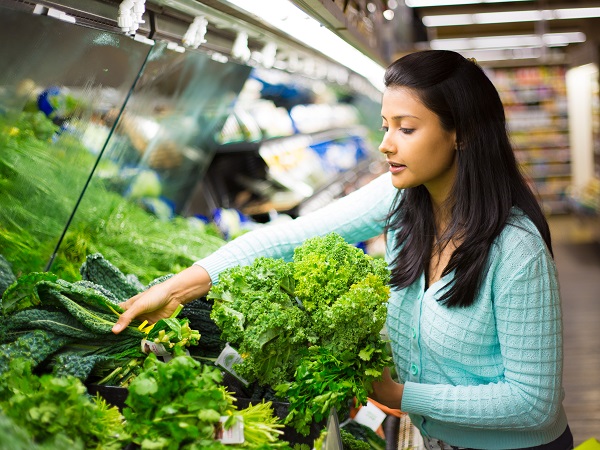Fresh produce encompasses fruits and vegetables, which are essential components of the current product range offered by FG. Whether in their natural, unprocessed state or presented in a variety of forms such as cut, packaged, preserved, canned, flavored, and processed options, this category is in high demand owing to its numerous health benefits. This growing awareness of its health advantages is driving increased participation of this category in the food retail industry. The health benefits are a significant factor in this trend.
In today’s age, as consumers grow increasingly conscious of their health and nutritional intake, fresh produce has secured a top spot on their list of dietary priorities. It has become an indispensable component of their daily nutrition and culinary endeavors. Not only do these fruits and vegetables bring vibrant colors to the table, but they also infuse meals with a delightful array of flavors and diversity. Rich in vitamins, minerals, fiber, and antioxidants, they offer a treasure trove of essential nutrients
While all fruits and vegetables contribute to overall health and provide a spectrum of nutrients, incorporating a variety of them into your diet ensures a broader range of essential nutrients for the human body. Numerous studies in this field underscore the specific associations between certain fruits and vegetables and the reduction of disease risks in humans. For instance, fruits like apples, pears, citrus varieties, and green leafy, as well as cruciferous vegetables, have proven effective in reducing the risk of cardiovascular disease and mortality. In contrast, green-yellow vegetables and cruciferous vegetables are particularly suitable for diminishing the risk of cancer.
India’s F&V strength
India stands as the world’s second-largest producer of fruits and vegetables, following closely behind China. Recent statistics from 2021-22 reveal that this nation, home to the world’s largest vegetarian population, yielded a remarkable 204.61 million tonnes of vegetables. This marks a notable growth rate of 3.8 percent per year since the 2018- 19 production of 183.17 million tonnes.
Additionally, India produced 107.10 million tonnes of fruits, showing a commendable increase from the 97.97 million tonnes in 2018-19, with a compound annual growth rate (CAGR) of 3 percent.
This impressive cultivation of fruits and vegetables unfolded across 7.09 million hectares of land for fruits and 11.28 million hectares for vegetables, as reported by IBEF. Notably, in the realm of fruit production, states like Andhra Pradesh, Maharashtra, Madhya Pradesh, Uttar Pradesh, Tamil Nadu, Karnataka, and Gujarat are at the forefront. Simultaneously, the states of Uttar Pradesh, Madhya Pradesh, West Bengal, Bihar, Gujarat, Odisha, and Maharashtra emerge as the primary contributors to vegetable production.
In that same year, India successfully exported fruits valued at USD 750.7 million and vegetables amounting to USD 767.01 million. The primary export destinations for India include its South Asian neighbors and the Middle East, specifically the UAE, Bangladesh, Pakistan, Saudi Arabia, Sri Lanka, and Nepal. Despite these impressive figures, India’s current share in the global market remains at just 1 percent.
However, this share is expected to expand in the future as the country takes substantial strides in horticultural production, cold chain infrastructure development, dedicated research and post-harvest technologies, implementation of quality control procedures, and the formulation of supportive government policies.
Government support
The Indian government has been actively supporting the fruit and vegetable (F&V) sector, with a particular focus on improving its transportation and logistics. To facilitate the efficient movement of fresh produce from rural areas to major urban centers, the Indian Railways has introduced the Kisan Rail Service. This service involve the operation of trains dedicated to carrying perishable goods, agricultural products, seeds, as well as consignors and consignees. So far, a total of 157 such trains have been deployed on 18 different routes to transport fruits, vegetables, and other food products.
Furthermore, the Ministry of Food Processing Industries has launched the ‘Operation Greens’ (TOP to TOTAL) program, which provides a 50 percent subsidy for the delivery of fruits and vegetables via the Kisan Rail service. In an effort to address any remaining logistical challenges related to the inter-state movement of perishable fruits and vegetables, the Ministry of Agriculture has established a call center service aimed at reducing the involvement of middlemen
To better connect with farmers, the Electronic National Agriculture Market (eNAM), a nationwide electronic trading platform for farmers, offers valuable agricultural information and services related to commodity prices, quality, and online payments. These payments are directly transferred to farmers’ bank accounts, enhancing their access to important agricultural resources and market information.
Changing consumer trends
The market has undergone a significant shift, with consumers moving away from traditional brick-and-mortar stores and local vendors to embrace online platforms for purchasing fruits and vegetables. This shift was accelerated by the COVID-19 pandemic, prompting people to increasingly rely on online fruit and vegetable apps to fulfill their fresh produce needs. The online channel offers a broader selection and delivers purchases conveniently to the buyer’s doorstep, thanks to improved last-mile delivery efficiency and formalization. In tier 1 and 2 cities, we now see the proliferation of app-based self-service kiosks, various types of mobile shopping vans, and farmers’ supermarkets. Today’s consumers are not only seeking fresh produce but also demand food safety and traceability. Online shopping apps are addressing these concerns by providing essential information as a mandatory feature
Another change brought about by the pandemic is the increased demand for immunity-boosting fresh produce, such as ginger, garlic, papaya, amla, and other items with medicinal properties. High-value items like basil, iceberg lettuce, strawberries, as well as citrus fruits like kiwis, cherries, avocados, oranges, and pears have also gained popularity. This period has introduced organic vegetable washes and fruit and vegetable cleaners that not only ensure hygiene but also enhance the overall safety of these products.
The prices of fruits and vegetables are a crucial part of household budgets, and government efforts to control prices are driven by this reality. In the latter half of 2023, there were instances that reflected the government’s mixed success in containing inflation in this category. For example, the Indian government removed the 20 percent additional duty on US apples that had been in place since 2019. This additional duty had inflated the retail price of US apples, reducing their demand. The removal of this duty restored competitive pricing, ultimately benefiting consumers.
Conversely, the government struggled to contain the prices of onions. In August, a 40 percent duty was imposed on onion exports, and the government procured an additional 2.5 lakh tonnes of onions in 2022-23 to create a buffer stock and control inflation. However, due to prolonged extreme summer heat, a significant portion of the onions deteriorated in quality, leading to higher prices even for the good quality onions
The pandemic period gave rise to a burgeoning start-up culture, with India now estimated to have over 1,000 start-ups in the agro-tech sector. These start-ups have evolved from the traditional, informal, and analog markets of earlier stages into more creative, formal, and digital entities with a wider reach to their target consumers.
The sector is witnessing a series of investments and mergers, signaling the growing interest of investors in this expanding market. This trend is exemplified by Ninjacart, which partnered with Brazil’s agribusiness marketplace Arado to facilitate seamless connections between farmers, retailers, and consumers. In 2022, Ninjacart secured approximately USD 9 million in funding from
South Korea-based STIC Investment and Singapore-based Main Street Digital Life IV Pte Ltd, with support from notable investors like Tiger Global, Flipkart, Qualcomm Ventures, and Accel
To date, the start-up has raised a total of USD 358 million in funding. Additionally, Chennai-based agritech start-up Waycool is reportedly in talks with multiple investors, including sovereign funds, impact funds, and family offices, to secure funding in the range of USD 50-70 million. If it crosses the USD 1 billion valuation threshold, Waycool could become the country’s first agritech unicorn, surpassing its peers like Flipkart and Walmart-backed Ninjacart, and Patna-based DeHaat.
Category challenges
The category of fresh produce is undergoing significant changes within the Indian retail landscape, yet it faces several notable challenges. The foremost challenge in both producing and selling fresh produce lies in ensuring their quality, freshness, and prompt delivery. Quality, in this context, pertains to the elimination of undesired substances such as pesticides, bacteria, and chemicals employed during the growing and harvesting processes. To guarantee this, numerous standards and appropriate legislation have been established at the national level.
Moreover, fruits and vegetables are primarily consumed for their nutritional benefits, which are at their best when these items are fresh. This underscores the importance of maintaining freshness throughout the supply chain, from production to the consumer’s plate. This task becomes all the more daunting when you consider that the segment grapples with a staggering 40 percent wastage along the value chain. In light of these challenges, companies are actively striving to achieve the ambitious goal of delivering fresh produce to consumers immediately upon harvest, a goal that is undoubtedly challenging but not insurmountable
Era of technology
Technology has been a significant boon to several growing sectors, agriculture being no exception. One such technology making a profound impact is Blockchain, and it is proving to be a valuable processes involved in their production, right back to their source. Consequently, Blockchain ensures controlled production with precision, safety, efficiency, and, importantly, cost-cutting.
The fresh produce industry faces various challenging activities, such as the need for specific identification and tracking of commodities with high levels of pesticide residues, ensuring the sustainability of farming.
Conclusion
The fresh produce industry in India is experiencing a transformative phase marked by evolving consumer preferences, robust government support, and the integration of cutting-edge technology. The demand for fresh fruits and vegetables has surged, driven by heightened awareness of their health benefits, making them a dietary priority for consumers seeking essential nutrients.
India, as the world’s second-largest producer of fruits and vegetables, is witnessing remarkable growth, particularly in states like Andhra Pradesh, Maharashtra, Madhya Pradesh, and others. Government initiatives, including the Kisan Rail Service, Operation Greens, and the Electronic National Agriculture Market (eNAM), are enhancing transportation, subsidy programs, and market access for both farmers and consumers.
The COVID-19 pandemic accelerated the shift towards online platforms for purchasing fresh produce, offering convenience and food safety features. The increased demand for immunity-boosting produce and organic options has led to an expansion of the market, with numerous startups receiving substantial investments
Challenges persist, such as maintaining quality, freshness, and reducing the significant 40 percent wastage along the supply chain. However, technology, including blockchain and farm management software, is playing a pivotal role in addressing these issues, ensuring safety, efficiency, and cost-effectiveness.




